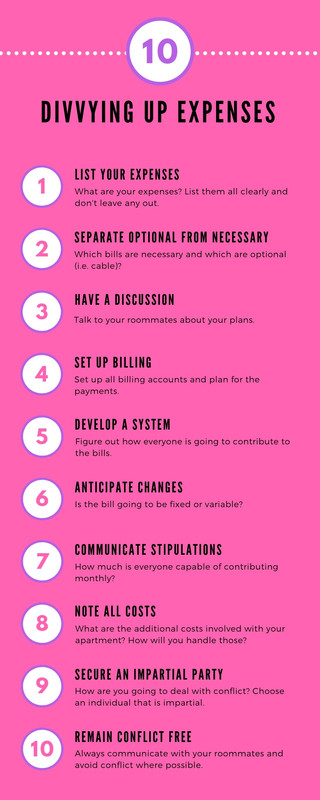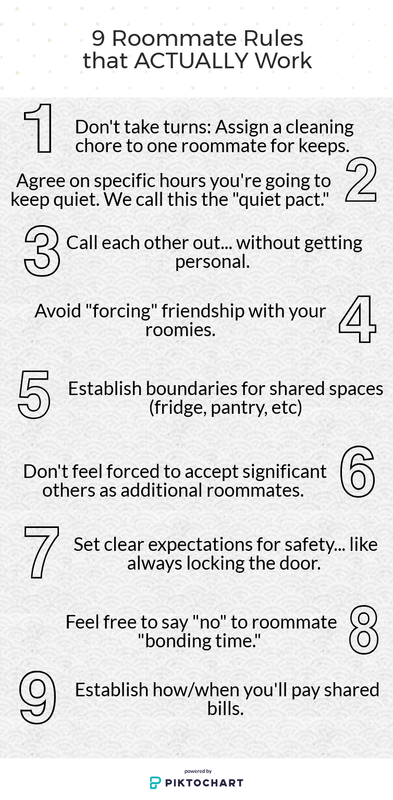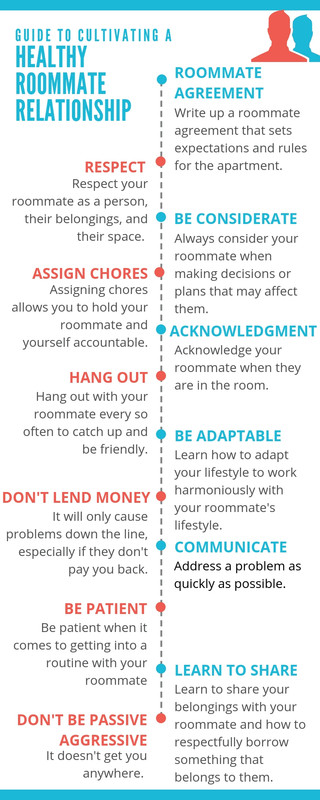College Roommate Tips
How to Divvy Up Expenses with Your Roommates
Living with roommates is no easy task. More often than not, arguments ensue, and in terms of the content of those arguments, you can bet finance is largely involved. Getting a group of individuals in one place to share expenses isn’t a walk in the park, but it doesn’t have to be too hard, either.
So what’s the best way to fairly divvy up your expenses amongst your roommates? While there are a lot of variables to consider here, these 10 tips for divvying up expenses is a great starting point to conflict resolution!

1. List Your Expenses
Obviously not the most challenging part of the process, listing out your expenses for the year is a great way to begin any financial conversation. Simply create a detailed list of each additional expense (not covered by your lease) that you and your roommates are responsible for.
This includes, but isn’t limited to: rent, water, gas, electric, cable, internet, parking and any other additional fees that may not be clearly defined by your lease. While most leasing companies will fairly split lease bills amongst roommates, others will not, so it’s always better to be safe than sorry.
In this way, simply developing a list of all expenses will ensure that everyone is on the same page and that all potential bills are included in your discussion.
2. Separate Optional from Necessary
Here is one of the more challenging aspects of splitting bills: which are necessary and which are not? Consider the bills that everyone will contribute to because everyone takes advantage of gas, water and electric. These are necessities.
Now consider the bills that aren’t necessary to living situations, but that are enjoyed by most, if not all: cable, internet, and parking.
A large part of roommate conflict comes from who should contribute to these bills and who is reaping the benefits of the optional bills without contributing. By separating the necessities from the optional bills, you can have this discussion with your roommates. Is everyone going to use the cable? If not, who will split that cost? And how do you proceed if someone that isn’t contributing uses that item?
Again, these are challenging conversations, but splitting your bills into optional versus necessary will help to get you started.
3. Have a Discussion
Perhaps one of the most important items on this list, it is absolutely essential to have an open and honest discussion with all of your roommates regarding finances. This not only includes the above point on necessary versus optional bills, but it also comes down to who can afford what and how to proceed in terms of divvying up bills.
Never assume that your roommates all have the same budget that you do because odds are, they don’t. Expenses look different for everyone, so never assume something that is affordable to you is affordable to another as well.
Conversations between you and your roommates surrounding finance will only serve you better in the long run, especially considering the conflict that typically surrounds finance.
4. Set Up Billing
Once you’ve had the necessary discussions, it’s important that the roommates all work together to set up billing information. More often than not, only one person’s information is necessary to receive bills, so you must decide who will be that person for each account.
Many roommates put one name on all bills and split them up amongst themselves, others work directly with the company in question to ensure that everyone’s name is on the bill to avoid problems down the road. Whichever path you and your roommates choose for splitting up your bills, ensure that everyone is on the same page before you move forward.
Also note that some payment methods, such as credit, can incur additional costs and fees that all roommates may not be willing to pay. Just be sure that whatever method you’ve chosen is one that everyone agrees upon and that everyone is comfortable with, especially considering these hidden or extra fees.
It’s very easy with bills to be the individual that’s left with the bulk of the cost, so don’t fall victim to that problem! Again, it’s all about communication and ensuring that all of the roommates are on the same page at all times.
5. Develop a System
As previously stated, it’s very important for you and your roommates to develop a system in which you pay your bills on time and fairly, which is easier said than done. While you may have covered the billing information, there is still the problem of ensuring that the bill is paid on time every month.
Personally, my roommates and I put one person’s name on all of the bills for automatic payments linked to their credit card. This way, we ensured there was never a late fee on our bills. From here, the individual stuck the bill in question to the fridge with a magnet and everyone gave her a check with their quarter of the bill paid so she could deposit that to her account.
For some, this is the easiest way to pay bills. For others, this will not work. Basically, you need to develop a system that will work for each roommate and that will ensure your bills are paid on time and split as discussed by everyone.
This is another important conversation to have amongst the group. How does everyone plan to pay their share? What’s the easiest way to achieve that? Do you foresee any problems with these methods of payment? So long as everyone is communicating their questions and concerns with one another, you will be able to develop a system of payment that works for everyone and that you can fall back on throughout the academic year.

6. Anticipate Changes
That all being said, you also have to brace yourself for changes. The truth of the matter is things change, whether you’re prepared for that change or not.
For instance, in the summer, you may be paying more money to cool your apartment down, while in the winter you could be paying significantly more to heat it. Just because your bills are one rate one month does not mean they will be the same rate the following month. You have to anticipate the fact that your bill may change monthly, and that those changes may be significant.
While you can anticipate a fluctuation in water, gas and electric bills, also prepare for changes in your cable and internet bills, as rates can change without notice. Be sure to set expectations with your roommates in the event that rates go up, as sometimes this can mean the difference between a bill being affordable and not.
Basically, if you prepare for these events in advance and set expectations as far as how much you can afford at most per month, you will be in a better position when these unexpected changes come around.
7. Communicate Stipulations
As mentioned above, it’s always a good idea to communicate stipulations to bills prior to involving yourself. For instance, as mentioned above, if something is going to be too expensive for you, it’s better to mention that ahead of time than it is to mention it when it’s too late.
For example, what does your monthly budget look like for these bills? Are there any ways to cut costs to ensure you don’t exceed that budget? A good example of this is with the heat. Perhaps you’re looking to cut down on your heating costs, but the best way to do that is likely to set your thermostat to a lower temperature. This is something that you and your roommates will need to agree upon ahead of time, but that’s entirely doable.
In addition, to decrease cable costs, you can limit the amount of channels you receive. Some individuals may be willing to contribute a little more monthly for extra channels, or perhaps even pay a little extra to ensure they have cable in their rooms as well as in the main living space. There are plenty of ways to split bills and cut costs, but it requires communication amongst all of the roommates as well as the setting of clear expectations.
Wherever you can work together to cut costs, you can set those expectations ahead of time to ensure that everyone is on the same page when it comes to the monthly bill budget.
8. Note All Costs
Again, it’s absolutely essential that you note all of the costs associated with your bills. Each roommate can only be on the same page if everyone is aware of what the costs are going to be.
For my roommates and I, the easiest way to do this was to keep track of past bills so we could anticipate the amount of money we needed to save for the next bill. While some fluctuated from month to month, the average was pretty similar, which allowed us to guess how much we needed to contribute to bills on a monthly basis.
Some individuals hang the prices of each bill on their fridge so everyone can pay attention while others simply communicate the costs to each other once a month when it comes time to physically pay their bills.
Whatever your style, be sure that everyone is on the same page and aware of the costs and you’ll be successful in terms of avoiding conflict related to finance.
9. Secure an Impartial Party
Something that most roommates don’t secure, but that it would be helpful to have just in case, is a secured, impartial party. This is typically a mutual friend that all roommates agree can be impartial and step in during the event of a conflict.
For instance, let’s say you and your roommates disagree on who owes what on a bill. If your other roommates are unable to help make a decision, an impartial party can come in, hear the story out and make a decision that is fair and correct.
While this isn’t always a possibility (as there are many instances in which an entirely impartial person can be secured), this is a good idea to have in your back pocket, just in case.
10. Remain Conflict-Free
Throughout these 10 points, one theme is common: remain conflict-free. Basically, the best way to ensure this is achieved is through communication. Roommates must all communicate with one another in order to set expectations and ensure bills are divvied up fairly.
Additionally, however, remaining conflict-free is about maintaining an even, understanding temper so that, when potential conflict does arise, it’s easy to navigate away from it and remain conflict-free.
For example, if you foresee a problem with a bill due to an error in communication, let your roommates know as soon as you catch this problem and work together to brainstorm a solution. Or let’s say you forgot to pay a bill that you were responsible for and now there is a late fee. Rather than asking everyone for additional money, communicate the error and come up with a solution that everyone feels is accurate and fair.
There are plenty of ways in which a conflict can arise, especially when living in close proximity to one another and involving finance, an already touchy subject. Just be sure to work with one another and communicate as often as possible and you’ll be just fine!
Again, it’s hard enough living with other people, but conflicts involving expenses complicate this situation even further. So stop spending so much time worried about finances, divvy everything up fairly to avoid future conflicts, and enjoy the situation you’re in.
These 10 tips will help to get you started, but have a conversation with your roommates to ensure everyone is on the same page prior to divvying up expenses. Not only will this help put all conflict at ease, but it will also ensure you and your roommates are in a good financial position throughout the duration of your lease.

10 Ways to Bond With Your Roommate
For many students, going to college is the first time they have to share a room together, whether it is a dorm room or an apartment. Even if you have shared a room with a sibling, sharing a room with someone you just met can seem daunting at first. There are horror stories from students about terrible or weird roommates, and many fear that these will be true for them. However, even if you do not instantly hit it off with your roommate, there are ways for you to bond so that you can get to know each other and bond. Even if you end up not liking each other, you have to live together for the time being, so spending some time together to be on the same page is crucial to making it through. Here are a few ideas for ways to spend some quality time together while learning more about each other’s likes and interests.

Attend your campus’ club and organization fair
Many college campuses have a club and organization fair that showcases the school’s various ways to get involved on campus. Attend the fair with your roommate to allow yourselves to see what the other likes. If you find something that you are both interested in, sign up for the organization together as a way to spend more time together. If you decide to join different clubs or organizations, finding out what each of you is interested in is a way to get to know each other. Make it a point to attend one meeting or event of each other’s club if you join different organizations and support fundraisers the club is putting on to show your roommate that you care. Find out how to start your own campus organization if you are both interested in a club or organization that your campus does not offer. This process in itself will be a great way to figure out how your roommate works and will bring you closer together.
Designate one evening a week to do something special
Designate one night a week to do something special together. Make it consistently the same evening each week and honor this time commitment by not scheduling anything else during this time unless it is absolutely necessary and cannot be avoided. Having one night that is designated for spending time together gives you an opportunity to try new things together, which can help bring you closer together. It also gives you a chance to find out what your roommate likes and allows you to see what you have in common. If you like different things, it gives you a chance to experience something your roommate likes, which is a great way to show your roommate that you care and are willing to do something that you may not have done if not for them. Plan activities ahead of time so that you are sure you are committed and that you have something to look forward to.
Have a night in and order pizza or take out. Have a game night where you bring out your competitive sides. Pamper yourselves with a spa night complete with facials, nail painting, and relaxing music. Binge watch a TV show that neither of you has seen or watch each other’s favorite movie. Have a conversation about the show or movie. This will give you a chance to learn how your roommate perceives movies and will give you a new perspective of a movie you may have seen a million and one times before. Throw a party and invite your friends or floormates. This will give you a chance to meet each other’s friends and will allow you to get to know others on your floor, which is also important.
Get out of your dorm or apartment. Explore your college town by finding a locally-owned restaurant or store. Go to a concert or other cultural event. Going to a concert or play on campus is a great way to support your fellow students while spending time with your roommate. If you go to an event in your college town, make a night of it and grab dinner beforehand. Go to a sporting event. Cheer on your school’s team together or go to a professional sporting event where you are cheering for each of the teams from you and your roommate’s hometowns. Volunteering is a great way to make a difference while learning what kinds of causes your roommate cares about. A night out on the town will give you a break from the stress of college life and gives you a chance to expand your horizons.
Take a class
Taking a step out of your comfort zone to learn something new is more fun when you do it with someone, and who better to do it with than with your roommate. Whether you arrange your schedules to take a GenEd or elective class together, go to a local library to take a language class or take a fitness class together at your campus gym, learning something new together will help you bond with your roommate and will help you find a common bond, especially if you both love or hate the topic of the class. You will learn more about each other’s likes and skills as well as your own. You will also expand your horizons by learning more about the world around you. Getting out to learn something unexpected can lead you to new and beautiful things, so overcome your fear and sign up. If you do end up taking a college class together, make sure your roommate attends class and does not solely rely on you to cover and take notes if they routinely miss class.
Make playlists of your favorite songs to play for each other
Music has the power to help bring people together and a person’s choice of music can say so much about who that person is. Make a playlist of your favorite top 10 favorite songs and/or artists and have your roommate do the same. Play the playlists for each other. You may find that you have a common interest in one particular style or band. This can help fuel conversations. If you each have music that is important to your culture or religion and you include these songs, it is a great opportunity to teach your roommate something about you and to learn something from your roommate. Listening to each other’s playlist may introduce you to new music you love and will open up new doors and other friendships for you. Have a conversation with your roommate about why you each picked the songs you did and what each song means to you.

Create a bucket list for the school year
Make a list of things you want to do together this semester or year. It can be as simple as going to that hip restaurant off campus or getting better grades. You can also aim to join a new organization and do it together so that you do not feel as anxious about doing something new. Having similar goals and a common drive to accomplish them will bring you and your roommate together in ways nothing else can.
Also, create separate lists and hold each other accountable, as you are more likely to succeed if you tell others what you hope to achieve. Be a part of each other’s bucket list, even if you choose not to create a joint list. Hang the lists in a public place and have a place to publicly and visually track your progress. Create a schedule to help you stay on track with your bucket list. Help each other stay on track with your schedule and encourage each other when things get tough.
Study together
They say misery likes company, and this is especially true when you are working on schoolwork. Studying together may not seem like a big deal, especially if you are working on separate subjects or assignments, but it can really bring you and your roommate together. Just doing a common activity and holding each other accountable to stay focused is crucial. If you are working on separate assignments and one of you runs into an issue that the other is good at, you can help each other out. This helps you learn each other’s skills and shows you the other’s strengths and weaknesses. You can look over each other’s work once you are done and proofread each other’s papers. When you are working alone, it can be tempting to keep working when you need a break or get distracted when you need to focus. Studying with your roommate helps you stay focus but also helps you know when you need to take a break.
![]()
Follow each other on social media
Some people are more outgoing on social media. You may find out more about your roommate than you do in person. You can follow their social media pages to learn about what they like and who they are. If you find something about a recent trip they went on or a concert they went to, ask them about it. You may also see that you have mutual friends, depending on where you both grew up. Ask them about how they know people you know. Finding information, such as likes and mutual friends, through social media helps you find common ground with your roommate and gives you interesting talking points for great conversations.
Decorate your room together
You will be living with your roommate for at least a semester, so what better way to bond than to decorate your dorm or apartment together. Even if you have totally different tastes in style, you may be able to combine these styles into one cool look or have separate spaces for each of your styles, depending on how much room you have. Having clashing styles is easier in an apartment since you will likely have separate bedrooms, but you will have to compromise on common areas. Decorating your room together is a great way to bond as you will learn about each other’s design style as well as decorating talents. You will learn about each other’s favorite colors and personal style. A person’s interior design style can say a lot about who they are and how organized they are, which is crucial for a roommate. You can even go shopping together for anything you were unable to bring with you to the dorm or apartment.
Communicate with each other
Communication is absolutely key to any relationship, but it is even more important if you have someone you are living with. If you cannot hold a conversation because you do not get along, you need to figure out a way to put your differences aside so you can at least make it through the semester. Talking gives you an opportunity to update each other on what is going on in your lives and to coordinate schedules for things that are happening. This is especially important if your roommate will be out late one night. Exchange cell phone numbers and text each other throughout the day. You do not have to talk every second of the day, but being able to contact each other about specific issues is important in emergencies. Know each other’s schedules so you know the best time to chat. Have a conversation right before bed so that you
Create a roommate agreement
If you are a Big Bang Theory fan, you will know that Sheldon has a huge obsession with his roommate agreements and is a strict stickler for each individual rule that they contain. You also know that his roommate agreements are super long and in-depth. You do not have to go as in-depth with your agreement, though. While it is important to bond with your roommate and be friends, having a roommate agreement will help you set boundaries and delegate chores such as cleaning and doing dishes. Have a section about what to do if you and your roommate get into an argument and set boundaries for things such as sharing clothes and personal items. Set up a cooking schedule and have a place in your agreement for paying rent and other essential bills. Your agreement should also include a section on bringing significant others into the dorm or apartment and have contact information of a neutral person you should get in touch with in case of an argument about a policy. Have this person witness you and your roommate signing the agreement.
At first, you may be nervous to meet your new roommate, but if you give it some time and effort, you and your roommate may become close friends. There is a chance that you will not get along, but give it a chance and put in the work to at least get through the semester together.

How to Live with a Roommate Who is the Opposite of You
Living with roommates can be an intimidating experience, but it can be more intimidating if you and your roommate are very different. How can you reconcile two different lifestyles to create a peaceful and happy living situation? In this article, we’ll discuss how to live with a roommate who is the opposite of you.
Communicate your expectations
When living with a roommate who is the complete opposite of you, it is extremely important to communicate your expectations. It is likely that you will have different expectations for your living situations than your roommate has. Still, that doesn’t mean you are bound to have a difficult living situation! You just have to be aware of each other’s expectations and come up with a compromise so that both of your needs are met.
For example, you might expect to clean the kitchen after every meal, while your roommate expects to do all the cleaning at the end of the day. These are both good ideas, but you two will have to come up with a compromise so that neither of you feels frustrated. Preferably, before you move in together, have a discussion about your expectations for things like cleanliness of the bathroom and kitchen, guests (especially overnight guests), how you will split the rent, eating each other’s food, and borrowing each other’s things. If you and your roommate discuss your expectations about these things, there will be fewer surprises when you move in together because you’ll have a better idea of what you are getting yourself into.
Address issues right away, and in person
Unfortunately, when people live together, issues could arise. If you are a non-confrontational person, it might be easier to “sweep it under the rug” if an issue comes up. But if you ignore an issue for long enough, you risk becoming angry and resentful toward your roommate, who might not even be aware they’ve done something to bother you. Instead, when an issue comes up, talk about it in person, not via text (which can very easily be misinterpreted and cause even more issues). Choose a time when you are both in a good mood and without distractions. Of course, be respectful to them, too. If you do this, and your roommate is a decent person, they will likely try to change their behavior and resolve the issue. Even though it might be uncomfortable, talking to your roommate about any issues increases the chance that the issue will be resolved.
Respect their wishes
On the flip side of the coin, your roommate might have an issue with your behavior. If this is the case, don’t get defensive right away (as that’s usually our first instinct when we are called out). Listen to what your roommate is saying, and honestly consider if they are right. If they are, then respect their wishes and adjust your behavior accordingly. For example, if your roommate complains that you are too noisy, try to talk more quietly and turn down the volume of your music or TV. If your guests have been over-staying their welcome, make sure they don’t do it again. Living with another person involves working together, and that means to respect your roommate’s wishes.
Be understanding and patient with each other
When you live with someone very different than you, you will need to be understanding and patient with each other. For example, you can ask your roommate to be quieter, but you can’t change their night-owl tendencies. In this case, you will just need to be understanding and patient with your roommate. Other times, they might forget to do a chore they said they would do. In this case, be patient with them. You don’t know if they forgot because they were busy working! In short, be patient with your roommate, because one day, you will need them to be patient with you!
Extend common courtesy
This should go without saying, but please extend common courtesy to your roommate. Clean up after yourself, especially in the common areas, bathroom, and kitchen. Keep your things in your room, don’t leave them lying around in the common area. Don’t make too much noise. Always say “please” and “thank you,” ask before you borrow something (and give it back), and don’t eat their food (unless they specifically gave you permission to). Give them space if they want it. Extending common courtesy will make your roommate relationship much more comfortable.
Respect each other
Lastly, roommates need to respect each other. Yes, you two might have different sleep schedules and cleanliness preferences, but as long as you respect each other, you should have a good experience living together.
It’s not easy living with someone who is the opposite of you, but if you respect each other and communicate your expectations, you can still have a great living situation.
10 Fun Roommate Dates for Fall
During this time in the semester, we all are busy studying for midterms, finalizing rough drafts on papers and balancing upcoming deadlines. All of this can make us stressed out and leave us with no time to enjoy the fall season and catch up on some quality time with our roommates.
Although this time of year is busy, there are so many ways to hang out with roommates, celebrate fall, and not fall behind on your school responsibilities. Check out these 10 roommate dates for the fall -- P.S. you get bonus points if you do all of them!

1. Make Haunted Gingerbread Houses: Who said that making gingerbread houses was exclusively for Christmas time? You can actually have so much fun during the fall season by creating your own spooky haunted house with your roommates! Some stores like Target already have pre-made kits to make life easier, but you can get creative and use just about any decoration you want, like edible glitter or multi-colored icing, just have fun with it!
2. Visit Haunted Houses: One of the greatest parts of the fall season is Halloween. Candy, costumes, scary movies -- what’s not to love? Gather up your roommates one weekend and take a trip to a haunted house attraction in your area! Typically, there are multiple little attractions in the same location, like a haunted hayride, corn maze, etc. This is such a fun way to have fun and celebrate the spooky season with friends!
3. Host a Halloween Party: A small Halloween party is a super fun way to meet up with roommates and catch up with them! To host a small party in your dorm or apartment, start by decorating with some inexpensive pumpkins, cotton cobwebs, and glow in the dark lights to give it that spooky feeling. Then find some fun, Halloween-themed snacks to make for your friends, like Hot Dog Mummies, Halloween Harvest Mix and Vampire Teeth Cookies! Lastly, find a spunky Spotify playlist that has all of the greatest Halloween hits to keep everyone dancing through the night!
4. Plan an Orchard Trip: I think just about everyone has at least one picture on their Instagram either picking an apple or holding a pumpkin during this time of year, and there’s nothing wrong with that! Apple orchards and pumpkin patches are so much fun to go to during the fall season. There’s the beautiful colors of the leaves, the crisp smell of fresh apples, and let’s not forget -- all sorts of yummy treats like apple cider doughnuts! Gather the roomies to take a trip to an orchard and don’t forget to snap a pic on the hayride!
5. Go to a Fall Festival: Fall brings out all sorts of happiness within me, and fall festivals are a huge part of that happiness. Fall festivals are a great way to hang out with your roommates because there are all sorts of food, music, and fun! No matter what, there will always be something that everyone can enjoy.

6. Have a Bonfire: I don’t think I know anyone who doesn’t love a good bonfire. On a nice, crisp and chilly night, get the roomies together and have a bonfire! Get a ton of warm blankets and pillows, light the fire, and enjoy the company of your friends around the fire. For bonus points, load up on graham crackers, chocolate bars and marshmallows to make s’mores, you can’t go wrong with them!
7. Host a Friendsgiving: Sometimes while in college, everyone doesn’t get the opportunity to travel home for the holidays if they’re far away. Maybe this is the case with one of your roommates, maybe it isn’t -- but regardless, a Friendsgiving is a great way to bring everyone together and create that feeling of home while you’re away. Have each of the roomies prepare a dish like macaroni and cheese or mashed potatoes and collectively prepare and enjoy the meal together. Nothing says fall like being with friends!
8. Go on a Brewery Tour: If you are of legal age, going on a brewery tour with your roommates is such a fun way to get together and celebrate fall. Around this time of year, there are usually a ton of autumn-themed lagers and stouts, so it’s a great way to try new flavors and loosen up with your roomies!
9. Have a Fall Photoshoot: Fall is the perfect season to have a photoshoot with roommates and friends- the leaves are beautiful colors, the clothes are cute and comfortable, and the decor is fun and seasonal. Find a perfect spot on campus or elsewhere and have a photoshoot! Bring in some props like a pumpkin or a little chalkboard sign to add some fun!
10. Go to a Football Game: College football is one of the greatest elements about the fall season. It truly gets you in the spirit and hypes you up for the rest of the year! Gather up the roomies one weekend and head over to the football stadium for a day loaded with pictures, food and fun! Get there early if you want to tailgate!
Ultimately the best part about fall is being around those you love and care about. There are so many opportunities to do this, like the ones above, that I guarantee you’re going to want to do these activities every season. Don’t take this semester too seriously and remember to take the time to have fun with your roommates!.
9 Roommate Rules that Actually Work
Living with people can be one of the toughest parts of your young adult life. Whether you decide to live with your best pals or some people you found on Craigslist, there are so many dynamics when it comes to having roommates. There are several decisions to be made on top of trying to find a place with reasonable rent, walking distance to your classes, and in close proximity to all your favorite drive-thru establishments.
One of the biggest adjustments between high school and college is learning to live with someone in a dorm. There’s a pretty major learning curve for most students – as sharing a space that small is far from “normal” or “comfortable.” But even living off-campus oftentimes means having a roommate—and most of the time, more than one. So how do you decide who to live with and what rules to instill? What happens if the rules you planned on don’t end up working out? What if you absolutely hate living with the people you’ve chosen as your roommates? How do you avoid getting yourself into a sticky situation when it comes to roommates in college?

There are plenty of articles out there that’ll advise you on creating “roommate rules.” They’ll tell you to make a list of all the chores and take turns doing the heavy stuff. They’ll tell you to establish boundaries up front and make sure you hold each other to the same standards. They’ll tell you not to move in with your best friend, because it’ll ruin your friendship, and they’ll tell you to host “family meetings” with your roommates to solve your problems instead of trash talking to your mom. But there’s something that all of these roommate articles leave out: what are the roommate rules that actually work for college students?
Sure, it’s different with everyone. It depends on your house dynamic. Are there two of you or are there five of you? Do you each have significant others that stay over 6/7 nights every week? Are you all full-time students, or do some of you also work? Are there pets in the home? What are your habits during exam week?
It’s tough to try and judge a roommate situation without knowing all of the factors. Every little thing can make the biggest impact on how the household functions as a whole. It’s annoying that there isn’t some universal list of roommate rules that everyone seems to abide by. However, if you’re lucky, you’ll be able to make some of the rules work.
Here’s a list of nine roommate rules that will actually work in your college household this semester:
1. Steer clear of “taking turns” with chores. Instead, assign one roommate to each part of the household that’s important to keep clean.
Sometimes roommates think it’s a better idea to have a rotating cleaning schedule instead of assigning someone to each chore. For example, I remember the days of “I took out the trash last time, so now you need to take it.”
Instead of trying to keep up with “who did it last,” assign someone to always take out the trash. When it gets full, it’ll be easy to call someone out. Who’s in charge of the trash? Betty. Jump on Betty’s behind if she doesn’t take the trash out when it starts overflowing.
It’s definitely a lot easier to keep things clean when you’ve assigned each person a specific task. However, I wouldn’t assign anyone things like dishes or cleaning the bathrooms. There’s definitely something to be said about everyone doing their own little part. It helps keep the household functioning steadily if everyone pitches in and puts their own dishes in the dishwasher (if you’re lucky enough to have one!).
2. Make a “quiet pact.”
Regardless of whether or not you’re a light sleeper, you and your roommates should decide on “quiet times.” I’m definitely the roommate who gets up on Saturday mornings and starts my laundry and vacuums the living room. And if that’s going to bother you, I’m going to need to know. It would be helpful if we made a rule for Saturday morning quiet time. Do you want me to wait until noon? I’m probably not going to go for that, but I’ll settle for 10:30 or 11:00.
The same goes for evenings. I go to bed early. I don’t want you partying with your friends in the middle of the week at midnight, blasting your Taylor Swift noise while I’m trying to sleep. I have to get up in the morning and go to work, so let’s agree that you won’t play your music loudly with your pals after 10:00 pm.
3. Agree to call each other out without having to get personal.
One of the hardest things to do in college is live with people. On top of everything else you’re trying to balance, managing the dynamics of college students and living together sucks sometimes. So instead of harboring feelings when Betty “forgets” to take out the trash and holding a grudge against Lou Anne for playing her music loud at all hours of the night, agree to call each other out without having to get personal.
It makes it a lot easier to live with each other when you agree that every little thing isn’t an insult to who you are as a person. Sure, you conveniently forget to take the trash out every single time it’s overflowing, and if I were in charge of taking out the trash, this would never happen. But it doesn’t have to become a personal attack. A simple “Lou Anne, the trash is overflowing again” might be the reminder that your roommate needs to get their rear-end in gear and take it to the dumpster. Move past little things like this and you’ll be able to exist peacefully – guaranteed.
4. Don’t feel like you have to be friends just because you live together. Avoid “forcing” a friendship.
Being a roommate and being a friend are two completely different things. Set your boundaries up front and set them firmly. If you’re not interested in building relationships with the people you’re living with, don’t do it. Don’t feel like you have to force a friendship with the people you’re living with. Those are the worst kinds of “friendships,” and they aren’t even real.

5. Establish boundaries for the shared spaces – refrigerator, pantry, cabinets, living room, and shared bathrooms
If you set guidelines that one person’s bathroom is going to serve as the “guest bathroom” for when your friends come over, make it known that this bathroom needs to be kept clean all the time. Maybe assign it to one of the roommates who tend to stay the cleanest.
If you’re all sharing a refrigerator, assign shelves and drawers to each person. Otherwise, before you know it, you’re eating someone else’s food because you can’t remember if you bought that or not.
Assigning each roommate space in the pantry is also a good idea. Limit the amount of food that each of you can store at one time – otherwise, it’s going to become an overflow of non-perishables that will take you more than a year to eat.
6. Significant others aren’t guaranteed a place to shack up just because they’re a significant other.
Don’t feel pressured to allow your roommates to let their significant others stay over every night. Especially when it comes to paying for things like utilities, having an additional person in your home means your bill could be that much higher. Unless you’ve all agreed to their significant other staying over on a regular basis, don’t feel guilty about setting that boundary.
If you are going to give in and let them have their partner over for a majority of the week, discuss splitting the utility bill more ways to include the water and electricity their partner is using. Don’t feel bad about it – when you signed your lease, it probably didn’t include their boyfriend/girlfriend, no matter how “sure” they are about being in love/getting married.
7. Set clear expectations for locking the door, shutting windows, etc.
Nothing is worse than coming home to an unlocked, empty house because your roommates “didn’t check to see who was home.” It’s such a lazy excuse: “Oh, I didn’t know I was the last person to leave.”
Set a boundary and tell your roommates that you’ll all be expected to lock the door every single time you leave. That way, no one will ever come home to an empty house with an unlocked door and have to be scared for their life upon entry. Make sure everyone has at least one key, and if necessary, hide an extra one somewhere.
Consider “sharing” your location with your roommates. Not because they need to know where you are at all times, but because then there will be no excuses for not knowing who happened to be home when you left.
This might feel risky, but if you’re a female college student, here’s the perfect way to stay safe as well. I’ve gotten in the habit of telling my roommates when I’m going out with someone new, or when I’m exploring a new hiking trail with my pup. If they know to keep an eye on my location, and they haven’t heard from me in a few hours, they’ll surely come looking for me. As a female in college these days, you can never be too careful.
8. Participate in roommate activities when you want to, not every single time you’re invited.
It’s hard to step away from the people you live with sometimes. Maybe you even truly enjoy their company. Maybe they’re the type of roommates who want to have dinner together, watch weekly tv shows in the living room, and share a grocery allowance on a weekly basis. But know that it’s completely okay to walk away from invitations to do things with them on occasion. Just because you’re their roommate doesn’t mean you’re also their built-in playmate.
It’s okay to have time for yourself. It’s okay to say you have other things to do. It’s completely okay to lay in your bed and watch The Office instead of hitting every fall activity in town with the roommates you only like on your good days.
Self-care is of utmost importance. Especially in college. Do yourself a favor and sit this one out.

9. Talk about how you’ll pay bills, including deadlines.
Hopefully, you and your roommates aren’t fighting over who’s name to put the utility bill in because you all want the credit history to build. Once you get all of the bills figured out, you need to set up a payment system. Cash App and Venmo are both great apps to use if you want to send each other money, but this can get a bit hairy when one of you sends in the bill for the utilities and you don’t get the money from your roomies in time to cover the total of the check. That just gets awkward because then you owe a late fee from where you didn’t pay the entire total.
Whether you live somewhere that Wi-Fi is included or not, making sure you have all of your bills settled ahead of time is always a best practice. Tell your roommates that you’ll always send in your bill on the 10th day of the month (or whatever) and that they have to give the money to you by the 8th. Otherwise, they can pay the late fee. It’s not fair for you to have to cover their rear-end because they aren’t organized enough to keep themselves together.
Living with roommates can suck and make you wish that you’re never in this position again, and you’ll likely look forward to the days where you have your own place and you can run the dishwasher as often as you’d like. You can turn your music up loud, do your laundry every couple of days, and not worry about whether or not the kitchen is going to be a complete wreck when you get home. It’ll be nice to have a place of your own. But enjoy these days – the days of cheap rent and living with people who are going through some of the same things you are. Have a little bit of fun and try not to wish your life away.

How to Cultivate a Healthy Roommate Relationship
Living with a roommate can be challenging, especially if you find out your personalities don’t exactly mesh. Having a healthy roommate relationship is essential for harmonious living and a good year. It’s important to remember that a roommate relationship is different than a friendship. When you live with someone, you see their routine, way of life, and really get to know them as a person. Whether you and your roommate get along or not, there are a few things you can do to cultivate a healthy roommate relationship.

Have a Roommate Agreement
In the first few weeks of your lease, start cultivating a healthy roommate relationship by writing up a roommate agreement. This agreement will set expectations and ground rules for you both to follow diligently.
There are a few things your roommate agreement should include. The first should be your names and the address where you live. Next, write out all the expectations and rules you would like to enforce. This may be quiet hours, the number of people allowed to sleep over, or chore assignments.
Think of a roommate agreement as a legal document. If one of you breaches the contract, there should be a certain consequence. For example, you have to pay $5 towards rent or do a certain chore that week.
Keep the Common Areas Clean
The number one conflict between roommates is keeping the apartment clean. To maintain a healthy roommate relationship, try to keep the common areas clean. Feel free to keep your private bedroom as messy as you’d like, but if you share a space with other people, take the time to clean up your mess.
This includes the kitchen. Set a certain amount of time that dirty dishes can sit in the sink with your roommate. If possible, clean up your dirty dishes quickly to keep that healthy roommate relationship.
Respect Each Other
The biggest aspect to cultivating a healthy roommate relationship is to respect each other. This means respect your roommate as a person, respect their belongings, and respect anyone who they bring into the apartment. Don’t touch their things without asking or eat their food. When you show your roommate respect, they will most likely show you respect too.
Not only should you respect your roommate to have a healthy roommate relationship, but you should respect the home you live in as well. If something is broken, fix it. If there is a mess, clean it.
Ask Before Taking or Using
Living with a roommate can be a lot of fun, especially when they own cool gadgets or buy the most delicious food. If you have a healthy roommate relationship, they are probably more than happy to share their things with you. However, it’s important to ask your roommate to take or use something that belongs to them. It’s a form of showing respect to your roommate. It shows your roommate that you don’t feel entitled to their belongings just because you live in the same house.
Be Courteous
Being respectful and being courteous are two different things. To be courteous means to keep your roommate in mind when making plans or doing something around the house. For example, if you are planning on hosting a birthday party, the courteous thing to do is talk to your roommate about hosting the party. This doesn’t mean that you have to ask permission. It means that you will give your roommate a heads up that you are planning to have a party and making sure the day you chose works with their schedule and yours.

Respect Their Privacy and Space
When you live with a roommate and you really enjoy hanging out with them, it can be difficult to create boundaries when it comes to privacy and respecting your roommate’s space. Having a healthy roommate relationship means understanding that just because you live together, doesn’t mean you will spend all of your time together. If your roommate’s door is closed during the day, don’t go knocking all the time to hang out with them. Respect their privacy.
Also, never go into your roommate’s bedroom or through their things without asking. That is a definite invasion of privacy.
Make a Meal Together
Hang out with your roommate once a week or once a month. Life can get hectic and you can get busy, but it’s important to make time to hang out with your roommate and catch up with each other. When you live with someone who is super busy, it can feel that they don’t like you or want to hang out with you. Most of the time this isn’t the case. Try to plan time to catch up with each other hang out every so often so you cultivate a healthy roommate relationship.
Assign Chores
Once again, cleaning is one of the top things roommates argue about. So, nip the issue in the bud when you first move in together. Set chore assignments for each other to take care of the apartment. This can be listed on a sheet that hangs on the fridge or written in your roommate agreement. Either way, this assignment of chores will resolve any issues when it comes to cleaning because you are held responsible and so is your roommate for doing their assigned chore.
Acknowledge Your Roommate
There are times where you are stuck with a bad roommate. This situation can go one of two ways. You can both make each other miserable or you can play nice. One way of having a healthy roommate relationship is to acknowledge your roommate. This means greeting them when they walk into the room or saying goodnight before you go to bed. It’s making small talk with them about their day or paying attention to what is happening in their life.
Nobody likes to feel unwelcomed. So, make sure you acknowledge your roommate when they walk into the room.
Communication Is Key
This can’t be stressed enough. When something is bothering you, express it to your roommate. Don’t hold it in and be angry about it. Talk to your roommate about your issue and see how you can both resolve it. It can be as simple as ringing out the sponge after they wash their dishes. Or it can be as big as their significant other sleeping over all the time.
No matter how big or small the issue is, address it in a calm manner as soon as possible. The longer you wait, the more it will bother you and the angrier you will get about it.
Don’t Lend Your Roommate Money
Relationships get messy when it comes to money. Oftentimes one roommate will buy cleaning supplies for the house or a piece of furniture. It’s important to split any housing expenses with your roommates or else they may feel that they can take advantage of you and your money.
When looking for a roommate, you want to find someone who is in a similar financial situation as you are. This will take the stress off of making sure your roommate pays rent each month and can afford to split necessary expenses with you like utilities or cleaning supplies.
Whatever you do, do not offer to cover your roommate’s rent one month. You may never see that money again.
Don’t Be Passive Aggressive
Whatever you do, don’t be passive aggressive towards your roommate. It doesn’t get you anywhere. It only makes you and your roommate miserable. Instead of being passive aggressive, communicate what your problem is with your roommate. Sometimes your roommate may not even realize you are being passive aggressive! The best way to solve any problem is to be straightforward with your roommate and address an issue you have.
Be Adaptable
It may take a few weeks to adapt to living with a new roommate. You need time to get to know each other and their living habits. To cultivate a healthy roommate relationship, it’s important to be adaptable. If your roommate wakes up at 6 o’clock in the morning, then maybe you should start getting up early too. Keep an open mind about changing how you live so you and your roommate’s living habits complement each other. Who knows, you may adapt your lifestyle into a better one than before!
Go Out Together
Get out of the house with your roommate and go do something fun together. Just because you live together doesn’t mean you can’t go out together and make some memories. Maybe it’s an event on campus you’re both interested in or a movie you both want to see. This will give you a chance to get to know your roommate more and see them in another setting other than your apartment.
When you make memories and share experiences with someone, it allows you to grow closer to that person and form a healthy roommate relationship.

Be Open to New Things
We spoke about being adaptable, now it’s time to be open to trying new things. You won’t grow as a person unless you get out of your comfort zone and try new things. Who better to try new things with than your roommate? Maybe your roommate is vegetarian. You see the delicious food they cook and the veggie burgers they eat. So, why not try to be a vegetarian for a week or two? You may like it so much that you adopt the same lifestyle. When you try something that your roommate introduced you to, it shows them that you are interested in getting to know them and doing things with them, which helps to cultivate a healthy roommate relationship.
Don’t Expect to be Best Friends
Just because you live together doesn’t mean you will be best friends. If it happens that you really enjoy spending time together and like the same things and have mutual friends, then maybe you’ll become best friends. Don’t go into your lease with the expectation that you and your roommate will be best friends and hang out all the time. It doesn’t always work out that way.
What you should expect is to have a respectful and healthy relationship with you roommate where you are both considerate of each other and responsible for taking care of the apartment.
Be Patient
Patience will get you very far in life, especially when it comes to living with a roommate. If your roommate takes a while to do their dishes or puts the dishes away in the wrong cabinet, don’t get upset over it. Be patient with them. It isn’t worth sweating the small stuff. Focus on the bigger picture and leave your anger for when something really bad happens.
Learn to Share
Go back to the kindergarten mindset where you learn how to share. When you share things with your roommate, like movies, music, clothes, or games, it can feel like your belongings just doubled. It’s fun to share with your roommate! However, if you do borrow something from your roommate, make sure you ask for their permission and you return it in the same condition you borrowed it.
Have Fun!
Have fun cultivating a healthy roommate relationship! It doesn’t have to be all about walking on eggshells making sure you clean up the common area or tiptoe around your roommate. Hang out with them. Joke around with them. Dance around the kitchen in your pajamas on a Saturday morning while cooking pancakes. The most important thing about cultivating a healthy roommate relationship is to be open with each other and have fun with each other.
Cultivating a Healthy Roommate Relationship
Having a healthy roommate relationship doesn’t necessarily mean you are best friends with your roommate. It means that you both respect each other and each other’s belongings. It means that you are considerate and courteous when it comes to hosting people in the house or doing something that directly affects your roommate. It means hanging out every so often and talking together about what’s going on in your life. The most important thing when it comes to having a healthy roommate relationship is communicating openly and effectively with your roommate.

Bad Roommate? It Might be Time to Move Out
By Amanda Cohen
It is very difficult, especially in your first year of college, to find a roommate with whom you get along beautifully. Obviously, living in such close quarters with someone is going to be an adjustment and plenty of compromises will have to be made, but how do you know when it’s gotten to the point where the only source of unhappiness in your life is coming back to your “home” and feeling uncomfortable, sad, taken advantage of, angry, annoyed, etc.? How do you know when your negative roommate situation has gone too far? In extreme cases, yes, moving out may be the only option, but if you think you can make it work I highly suggest you do because moving out can be a major source of awkwardness and, let’s be real, moving into a new living situation is a pain in the butt. However, there are many factors that I believe exemplify when a roommate situation warrants a move-out date. Read on to find out.

The biggest and most obvious tell if you should move out is if you feel genuinely uncomfortable, scared, or sad every time you enter your supposed-to-be home. If you put your ear against the door of your room and hear your roommate and pass time somewhere else until he/she leaves, that’s when you know. I know this may seem extreme, but it does happen, I have witnessed it first-hand. Although, if you are feeling uncomfortable or anxious going into your living space because you just aren’t used to living with another person so closely, then that doesn’t warrant a move-out. If this is the case, you should communicate with your roommate and express your concerns and fears and work together to find a way to make both of you more comfortable. However, if you are scared because your roommate always yells at you, bosses you around, makes you cry, or dominates the entire living situation, I would try and find some new housing.
Since moving out is a last resort, you need to make sure that, before you take the final plunge, that you’ve tried communicating with your roommate as much as possible. By this I mean you have tried talking to your roommate about what’s bothering you and trying to come up with a compromise so that your living space is livable for the both of you. For example, it’s not fair to up and leave your roommate because he/she always wakes you up at 3:00 a.m., but you never told him/her that it bothers you when he/she does that. I know it can be difficult to talk to someone, especially if you are a little shy like me, but a simple conversation can save you weeks and months of misery and could even prevent you to reconsider moving out altogether. If you speak with your roommate and the behavior doesn’t change, talk to them again. If he/she still doesn’t try to change, talk to him/her again. If, after the third time, speaking with him/her nothing changes, sit him/her down and say that this living situation is negatively affecting you and you are going to move out since the “behavior” still persists. Your roommate will either finally take you seriously and change his/her act, or you really will have to move out.
If the above information still doesn’t give you any sort of clarity in your decision to maybe move out from your current situation, you just need to trust your gut. You will know when a bad roommate situation has gone too far… you will feel it in your bones. A really terrible roommate will cause you to feel anxious, sad, angry, frustrated, scared, and generally just uncomfortable. If your living situation feels less and less like a home, move out. If your roommate is a bully, move out. If your roommate doesn’t respect you space and your needs, move out. Although, like I said above, if you think there is the slightest chance of rectifying your current roommate situation, try and do so and explain to your roommate that he/she needs to meet you halfway in this endeavor. If you are still conflicted, talk to your resident’s advisor (RA) if you live in a dorm room and have him/her give you some insight and maybe even help you facilitate a productive conversation with your roommate. Don’t tell your roommate you’re moving out if you don’t have a new place to live… make sure you have a true fall back plan before telling your roommate your moving out because if you say you’re moving out and you don’t, that could cause even more friction.
Just remember, you deserve to feel happy and comfortable in your living situation. Even if you live in a tiny dorm room, it should still feel like a home and not like a place where you’re a guest. If you need to move out, do it. I know it’s scary, but college is hard enough as it is, don’t like a negative roommate situation be your breaking point.
Dealing With A Difficult Roommate
Unfortunately, living with another person isn’t always easy. Whether your roommate is your best friend since grade school or a random person you were assigned, it’s natural for disputes to arise. After all, adjusting to having to share close proximity to another person who isn’t family is a challenge for everyone. However, sometimes even the mildest roommate disputes end up escalating into tense, uncomfortable living situations. If this is the case, something should definitely be done to make a positive, healthy change for everyone involved.
The biggest thing to remember in the case of any roommate conflict is that you must take care of yourself. Even if the dispute doesn’t seem like “a big deal”, anything that causes you distress is worth addressing and finding a solution. Always keep in mind that avoiding a problem means avoiding a solution and that you deserve to have a stress-free environment to return to at the end of the day.
Roommate disputes are no picnic. In fact, if you are afraid of confrontation, they can be your worst nightmare. The stress can have an extremely negative effect on your academic performance, physical wellbeing, and mental health. So, it is imperative that you address issues with your difficult roommate quickly and directly. Having issues with a roommate is the furthest thing from uncommon and there is always a solution. Keep reading for ways to handle a difficult roommate!

Be Direct
When you start having issues with a roommate, the first thing you should do is try to address the issues calmly and politely. Leaving behind passive aggressive messages and being rude will only exacerbate the situation. Instead, speak with them and confront the issue with kindness. If you don’t appreciate them having loud guests over late at night or wish that they’d stop leaving a mountain of dishes in the sink, explain your feelings to them as soon as possible. Be sure to use reason and appeal to their better nature. For example, if they are constantly having loud guests over, let them know that you have trouble sleeping and relaxing when this happens. Keep in mind that no matter how annoying they are, your roommate is only human and they aren’t always capable of recognizing their behavior.
It is also important to make sure that these direct conversations take place in person, not over text or phone calls. Without a physical conversation, discussing a dispute digitally can end in a lot of issues if things are misconstrued. Even though it seems less scary to send a text than it is to confront someone in person, you will definitely find better results from addressing issues face-to-face.
Resist Pettiness
When you fight fire with fire, everyone gets burned. No matter how tempting it might be to throw your roommate’s several-week-old dirty dishes onto their bed or leave nasty notes taped to the refrigerator like some reality television show, acting out with pettiness can only make matters worse. Above all, you need to remember to be the bigger, stronger person in the end. Name calling, finger pointing, and nastiness will only breed more tension and stress for both of you in the end. There is no benefit to acting out immaturely unless you want to add living in a hostile environment to your bucket list.
The best way to avoid giving in to the petty urges is to remain calm and keep a clear head. Did your roommate use your kitchen supplies without cleaning them for the third time this week? Take a walk and some deep breaths before you bring it up with them again. Did your roommate let their S.O. eat your leftovers again? Order yourself another treat and take time to cool off before throwing rocks at your roommate’s window. When you have yourself together and you’ve silenced the Evil Kermit voice in your head, you’re ready to discuss your feelings with your roommate directly.
Create Distance
If all of your attempts at communication fail, try to build some distance between yourself and your roommate. It’s an unfortunate, yet obvious fact, that not everyone was meant to get along in the end. Sadly, if you and your roommate fall into this category, there isn’t much you can do to remedy the situation. For the sake of your mental health, make sure you take time away from your roommate every so often. Try studying in the library instead of your living room. Hang out with friends and see what there is to do on campus or around town instead of spending your weekends at home. While it’s definitely still your space that you have a right to, it’s also good to get a little distance every now and then.
A clear head and some space might help you to see solutions to your issue that you didn’t think of before. It could also shift your roommate’s perspective and help them to realize that their behavior is making you very uncomfortable.
Get Help
If your roommate’s difficult behavior hasn’t changed, it might be time to involve a third party. If you live in a dorm, contact your R.A. or Resident Counselor and discuss your options. University housing programs typically offer mediation services to settle all types of roommate disputes. This is especially helpful if confrontation scares you. If you live in an apartment, keep in mind that it isn’t the responsibility of your landlord or property manager to act as a mediator between you and your roommate. However, if you are persistent and present enough reasoning, you might be able to get yourself out of the situation entirely via a room switch or subletting.
If your difficult roommate becomes hostile, tense, or displays no desire to establish a healthy, cohesive household, it might be time to consider some sort of mediation or moving out entirely.
In the end, having a difficult roommate is not the end of the world. Living with someone new is always a difficult journey, but there are many ways to push through the hard times and improve the living situation for everyone. Always start by trying to have a calm, honest conversation in person. If pursuing a peaceful conversation or mediation doesn’t work, then it’s time for you to move on for the sake of your well-being. After all, the ideal roommate might just be around the corner!
Random Roommate vs. Choosing A Roommate: Which Should You Do?
Roommate horror stores – we have all heard our fair share of them. They can stem from a multitude of factors: messy roommates, random roommates, roommates’ significant others, or even roommates that you had the opportunity to choose for yourself. Regardless of the cause, roommate relationships can turn sour fast but also become roommate success stories just as fast.
Roommates are what you make of them, and you can take multiple steps to make sure that your roommate is as close to your ideal fit as possible. One of your first major decisions when it comes to choosing your ideal roommate is choosing between getting a random roommate or deciding to choose a roommate for yourself.
There are many pros and cons to both options and the “right” option varies from person to person. If you are wondering whether to choose your next roommate or leave it to fate to pick a roommate for you, here are some tips to help guide you to the option that is best for you in your upcoming decision:

What are you looking for in a roommate?
Consider what you are looking for in a roommate. Do you want to come home every day to someone that will be willing to hear how your day went or what’s on your mind? Someone that is going to be down to hang out whenever you want to knock on their door or head out to grab a meal? Or do you want someone that is simply going to cohabitate with you and keep things clean and simple in your shared living space?
If you are looking for the latter, you may be better off deciding on getting a random roommate. Most of the time, going the random roommate route will have you filling out a survey that covers most of your roommate habits and what someone should expect from living with you (roommate behaviors, cleanliness, typical routines, studying habits, etc.). Most of the time, the roommates you do end up with have similar habits to you and won’t be causing issues due to conflicting issues or habits.
When it comes to wanting to be close with your roommates, you may be more comfortable seeking out your own roommates instead of just relying on a random roommate to be your new best friend. Random roommates can become quick friends too, of course, but relying on yourself to pick your own roommate can ensure you are picking someone that you are comfortable with from the get-go.
Think about previous experiences with roommates
When it comes to picking a new roommate, think back to previous roommate experiences you have had, if you have had any. If you have had previous roommates, use them to your advantage, regardless of whether they were a great fit or a horrible fit. Consider what you liked about your previous roommates, and what you didn’t like.
Maybe you went with the option to pick a roommate for yourself in your last situation. The situation could have gone great, it was a close friend and your friendship was only strengthened by living together and seeing each other all the time. At the same time, living with a close friend can negatively impact your friendship. You can be great friends with someone, but you can be not-so-great roommates when you experience living with each other.
Or maybe you opted for a random roommate and it went well. Think about why it went well. Did your roommate fit all your roommate survey answers perfectly? Or did they fit a few key answers perfectly to make living together the ideal living situation? If you have the opportunity to fill out a survey again, pick your same answers to increase your chances at getting another ideal roommate at random.
Want to keep your living space private?
If you are one to savor your own private living space, opting to pick a random roommate may be in your best interest. You do not need to worry about your friends invading your space when you do not want them to if you go the random route. If you choose to live with your friend, you may be facing multiple situations in which your friend group invades your living space or find your friend asking to spend every waking moment with you when you are home.
When it comes to keeping your private space a private space, living with your friends may not be the best idea. They may take every opportunity to spend time with you. Cooking breakfast? Cook breakfast for two. Looking to spend time by yourself binging on your latest Netflix obsession? You may need to move over on the couch to make room for your friend-turned-roommate.
You can still choose your friend as a roommate and not have it turn out badly, but it’s important to set guidelines on defining your personal space or your “me time.” When it comes to random roommates, however, they are most likely going to be okay with not being the best of friends as long as you respect each other’s living spaces.

Choosing: What kind of person are you choosing?
If you are considering picking your own roommate, what kind of person are you choosing to live with? Choosing your own roommate can go multiple ways, but the end result you are looking for can heavily depend on how close of a friend you are going to be choosing to live with.
While your best friend may be the person you go to with your deepest concerns and the person you call up when you are looking for a good time, they may be far from what your ideal roommate is. You can get along on a personal level, but when it comes to roommate-related issues, you may be on opposite ends of the spectrum. You can be very clean, but your best friend’s idea of “clean” is picking up after themselves once every few weeks. The small differences that come out due to different roommate habits can create a big divide in your personal relationship.
At the same time, someone that is in your circle of friends that is also looking for your roommate can be your ideal roommate situation. You may not be two peas in a pod when you are considering your social circle, but when it comes to being roommates you can be a perfect fit.
Opting to choose your own roommate doesn’t necessarily mean you have to pick your closest friend by default, but if it means you are comfortable with your roommate, picking a friend to be your next roommate can still be a good decision.
If you are worried about how becoming roommates with your friends can impact your friendship, consider testing the waters. Ask what their own roommate habits are if you are serious about becoming roommates, or even scoping out each other’s living spaces if you want to see how they treat their own living space.
Opting for a new experience? Go random
Picking a random roommate does not need to be a roommate horror experience. If you play your cards right, you may end up with the roommate of your dreams.
Your experience with a random roommate can depend heavily on the system you are using to pick your future roommate. If you are going through campus housing (dorms or apartments), you will typically be required to fill out a roommate survey. The survey is full of questions that will narrow down the list of people that will suit your roommate needs.
Of course, this means you are relying on an outside factor – an automated system – to make sure you do not end up as the next roommate horror story, but one system is better than no system. The roommate surveys are in place for a reason, so if you are not lying to get what you think you want as a roommate
Opting for a random roommate may be overwhelming at first, but you will never know if it is the perfect option for you unless you try – don’t be afraid to go for it.
Worried about comfort level? You can be comfortable both ways
When it comes to worrying about whether or not you will be comfortable with one choice or another, you don’t need to be worried about one being comfortable or uncomfortable. Living with someone you know very well can be the obvious choice if you are looking for a comfortable living situation. You already know the person on a personal level, so you will not have to worry about awkward run-ins in the hallway or too scared to call them out for possible wrongdoings.
However, a random roommate – a stranger – doesn’t have to be the obvious uncomfortable option. Living with someone that is basically a stranger doesn’t have to be your worst option. Get to know them when you first know your housing situation. Discuss what you expect out of each other as roommates or even simple topics that will help you get to know each other to make you feel like you are not living a complete stranger.
You can make yourself comfortable with either option if you take the right steps to make yourself comfortable. Set guidelines when it comes to choosing your friend as a roommate. Discuss how it could possibly change your relationship, and how you can avoid the possible negative changes and protect your friendship. If you opt to go random, remember that you can still be comfortable. Get to know them prior to moving in and remember to still set guidelines about living together so that you can take proper care of making sure that becoming roommates goes smoothly.
When the going gets tough, random roommates may be the better option
Think of how close you and your friend are, and how you solve conflicts that come up between you. Maybe one of you has bailed on set plans before, leading to the other giving the cold shoulder. How did you solve the conflict and resume your friendship?
If you have realized how fights have negatively impacted your friendship in the past, becoming roommates may not be the next best step for your friendship. There are bound to be conflicts between roommates, no matter how small, and you do not want small conflicts to ruin your friendship. The dishes were left in the sink for more than a few days, or maybe your friend keeps bringing their boyfriend over. These things would do little to no harm to your actual friendship, but when it comes to being roommates on top of being friends, the small roommate conflicts can become personal and rather ugly.
If you are nowhere near sure on how becoming roommates can affect your friendship, you may want to stick to the option of getting a random roommate. There is a greater chance that their living habits will not clash with yours if you are getting matched through a survey-based system and is there an even greater chance your social circle will come out of the leasing plan unscathed if you pick a random roommate.
You won’t have to worry about how roommate conflicts will negatively impact your personal relationship with your roommate if you are simply roommate. If they really do end up being your own personal roommate horror story, you can stick it out until the end of your lease without having to worry about lasting damages to your personal life.
Being able to choose your own roommate may seem like the easiest option at a glance when you can pick your own friend, but it may not be the simplest option when you think about the lasting consequences.
Do not let everyone else’s roommate experiences shape your own roommate experiences. Remember that the choice between getting a random roommate or choosing your own roommate has no right or wrong answer. Pick whatever choice you are going to be more comfortable with because it is going to be the decision you are going to be living with.

When Things Go Wrong: Roommate Conflicts and How to Move Forward
Living with another person is not always sunshine and roses. Especially in situations in which you have met for the first time, living with a roommate requires a large amount of compromise, patience and understanding, all of which can be difficult in a stressful, college situation.
Roommate conflict, though never fun, is very common in college, so much so that resident advisors and other individuals in the dorms are more than prepared to settle disputes between residents.
Given the abundance of roommate conflict and the lack of experience for most students in this department, here are ten common conflicts as well as how to move forward.

1. Cleanliness
All too common in college dorm rooms, or even apartments for that matter, conflicts that arise due to cleanliness are perhaps the most common. Typically, you will end up in a room with an individual that is different than you in terms of their organization and cleaning style. For this reason, conflict can easily arise in these situations.
The conflicts typically involve a roommate that prefers everything to be clean and one that doesn’t care about cleanliness. No matter which individual you are, the conflict is likely to arise at some point.
The best way to deal with such arguments is to simply think about the other person and what they need from you. If you’re the roommate that is a bit messier, work a little harder to keep your side of the room clean. Conversely, if you’re the cleaner roommate, have a little more patience with the individual you are living with.
You can’t change another person, but you can change the way that you act and react to a situation, so make those changes and these conflicts will be cleared up in no time.
2. Sleep
Another common conflict that arises is related to sleep. Each roommate will have a very different schedule, which typically means that their sleep schedule is also different. This can certainly cause issues, especially if you’re living in close proximity, i.e. a dorm room.
Perhaps one of you goes to bed too early or stays up too late for the other roommate’s comfort. Or maybe one person needs the TV on to sleep and the other can’t sleep when it’s on. There are plenty of minor conflicts that can arise when it comes to sleep, and given the importance of sleep, these conflicts can also escalate rather quickly.
The best way to manage sleep-related conflicts is again to think of the other individual. Compromise is going to work the best in these situations, so figure out a way in which you can both get what you want.
For instance, if one of you needs the TV on, have that person play Netflix or stream TV shows through their laptop or phone with headphones. That way, it’s quiet and dark for the other individual and both people can get the sleep they need.
In addition, if you’re a bit of a night owl and your roommate isn’t, be courteous and do something that isn’t too loud/distracting so your roommate can get some sleep. You can also always go somewhere else to give them some extra quiet time.
3. Food
Especially in apartment living, food-related conflicts are abundant. Most roommates have a shared pantry/fridge in which their food is accessible to everyone. Some roommates go shopping together and split everything while others shop separately and mark their food items with their names.
Either way, there is always the potential of one roommate monopolizing the room in the shared space, eating someone else’s food and/or not pitching in enough money for the groceries that they are using.
The opportunities here for conflict are endless, which is why it’s so important to come up with a plan amongst your roommates that works for everyone. For instance, if you plan on sharing food, make sure that you all share food equally. In other words, don’t take more than your fair share. If you plan on buying food separately, mark everything with your name and don’t take anyone else’s food.
Basically, just be courteous and understand that shared food plans can be a cause for conflict, so go out of your way to ensure that doesn’t happen.
4. Homework
It’s college, which means there is going to be plenty of homework involved. Both you and your roommate will have homework to complete, but the amount that you have as well as the time it will take you to complete that homework is where the conflicts are going to arise.
One roommate may find that they have more homework than the other all the time, and these situations can mean one roommate is watching TV or something else distracting while the other is trying to work. There are going to be noise related conflicts here, one time or another, so it’s important to get ahead of the problem.
If you know you will have more homework than usual, or you know you need silence to complete your work, don’t do it in your shared space. Instead, go to the library or another quiet location in which you can complete your work.
It’s unfair to put the burden of silence onto your roommate in their own room, so make sure you’re being courteous and polite by removing yourself from the equation in these situations.
5. Company
You may have similar or shared friends, or you may have different groups of friends than your roommate, but having company over is another cause for conflict in some situations.
There are situations in which one roommate doesn’t like the other’s friends or vice versa, which can cause serious problems in a living situation. In addition, many college students have visitors that spend the night, which can also be a point of conflict in living situations.
The best way to deal with these types of conflicts is to communicate with your roommate. If you’re planning on having company, let them know. And don’t wait until the last minute. Give your roommate enough notice that they can make other plans if wanted.
In addition, be courteous as far as noise goes when you have company and you know your roommate is working on homework etc. The more you think about the other individual, the less likely a conflict is to arise in these situations.

6. Bills
Of course, there are always conflicts surrounding money, and paying your bills is no different. One roommate may be consistently late in paying their bills, someone may not contribute at all or someone may always end up paying more than anyone else.
Money conflicts aren’t unique to college, but given the shared bills, they are more likely. With that being said, there are very simple ways to avoid such conflicts.
The first way is to split up the bills fairly and evenly. Make sure everyone is paying their fair share and that no one individual is unfairly paying more than others. In addition, make sure there is a schedule and/or clear method of payment.
Set a schedule so that, by a certain date, every individual knows their bill is due. This way, there is less likely to be delays and/or problems related to late payments etc.
7. Thermostat
A minor conflict, but one that will probably come up, thermostat related conflicts are common in college. It may sound silly, but it’s absolutely true.
Some individuals are always cold, some are always hot. This is a problem that comes up in many shared spaces, but with roommates, it can cause some serious conflict. Either conflict comes up about the temperature itself or about the bills associated with using the thermostat. Both conflicts are avoidable, but require communication on everyone’s end.
The best way to avoid these conflicts is to have an agreed upon plan for usage. For instance, always having it set to a certain temperature will help avoid problems in which people are changing the thermostat. In addition, agreeing upon when to use and not to use the heat/air will help immensely in avoiding conflicts later on.
Come up with your plans ahead of time so that everyone is on the same page when it comes to thermostat usage. If you do that, the conflicts can easily be avoided. Communication is always key!
8. Shared Bathrooms
Sharing a bathroom with someone else is always a pain point, but when you have the same schedule as your roommate, it can become a much bigger issue.
Some roommates will take longer in the bathroom and prevent their roommate from using it when they need to, some will be messier than the other and cause problems, one may monopolize all of the space in the bathroom or use the other’s things - the possibilities for conflict here are endless.
Avoiding conflict here isn’t as easy as you would think, but again, communication is going to be your best method. For one thing, make sure that you split the space evenly. If you have more things than your space allows, keep them in your room to avoid taking over your roommate’s space.
In addition, only use the bathroom for as long as necessary. If you know your roommate has class at the same time as you, be quick and don’t spend too much time in the bathroom. If you can get ready in your room, do that. Monopolizing bathroom time is never a good thing, so keep that in mind. Just think of the other individual in these situations and you will be just fine.
9. TV Time
Some roommates will have TVs in their own rooms, which avoids this conflict entirely. However, for those sharing a TV, arguments can ensue about what to watch. Again, it seems minor, but it can create bigger problems in a living situation.
One roommate may monopolize the TV all day and night, both may not agree on a show to watch or one could monopolize the DVR and prevent the other individuals in the room from taping their shows.
Sharing a TV can be problematic, but being fair and splitting time evenly is the easiest way to resolve these conflicts.
For one thing, everyone can get the same amount of time with the TV so that the time spent is even. You can split this up however you see fit, but ensure that everyone gets their fair share of time. Second, if there is more than one person in the room, agree on a show before turning it on. Don’t monopolize the TV. Finally, make sure everyone is able to record the shows that they want. If they can’t compromise.
The more effort you put into ensuring the shared TV time is fair, the less likely any conflicts are to arise.
10. Lifestyle Differences
Last, though not least by any means, there are likely to be lifestyle differences between roommates, which can cause major problems in terms of roommate conflicts.
One roommate may like going out with large groups during the week while the other likes quiet nights in alone. One may be a couch potato and the other might be very active. There are so many differences in terms of lifestyle that can set you and your roommate apart and cause problems.
The best way to avoid such conflicts is, again, to be patient and understanding. You’re likely not going to get someone as a roommate that’s exactly like you, so go into the situation knowing that. You are unique, and so are they. Work together to get along and understand the other person to avoid any future conflicts.
Again, roommate conflicts aren’t fun, but they are common, which means that you’re more than likely going to experience them at least once in your college experience. With that being said, there are plenty of ways to resolve them and move forward, and hopefully, this article has given you a better understanding of just how that can be done.
Moving forward from here, make sure that you show a certain level of patience, kindness and understanding, and know that a roommate conflict is common and therefore not the end of the world. Just focus on your studies and you’ll be just fine!

